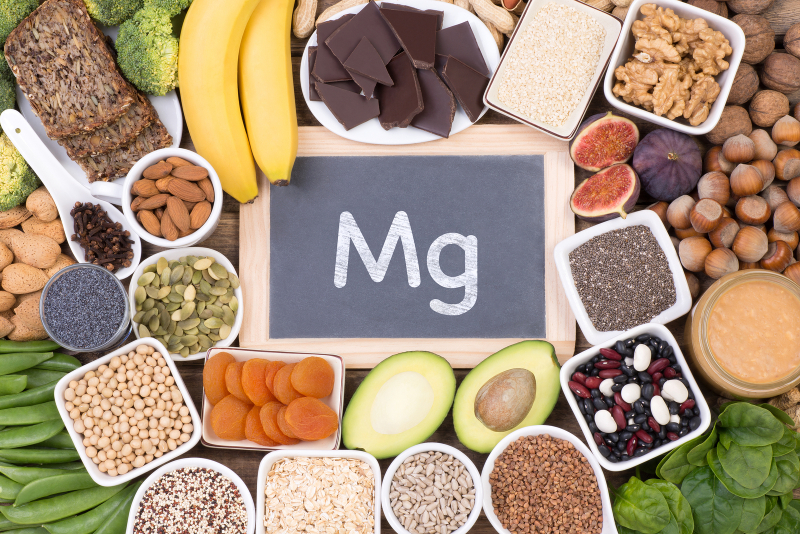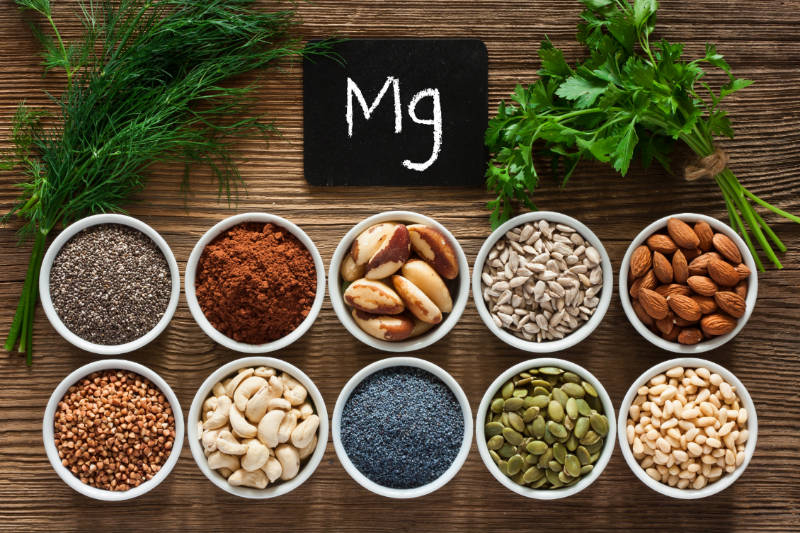Top 10 Evidence-Based Health Benefits of Magnesium
Magnesium is an important mineral in the human body, playing a role in over 300 enzyme reactions. It helps with muscle and nerve function, blood pressure ... read more...regulation, and immune system support, among other things. Here are some evidence-based magnesium health benefits!
-
Magnesium is needed for more than 300 biochemical reactions in the body. It helps to maintain normal nerve and muscle function, maintains a healthy immune system, keeps the heartbeat steady, and helps bones remain strong. It also helps in the regulation of blood glucose levels.
Magnesium is found in bone for around 60% of your body's magnesium, while the rest is found in muscles, soft tissues, and fluids, including blood. One of its most important functions is to act as a cofactor, a helper molecule, in the biochemical activities that enzymes perform on a regular basis. It has a role in over 600 bodily responses, including:
- Energy creation: converting food into energy
- Protein formation: creating new proteins from amino acids
- Gene maintenance: helping create and repair DNA and RNA
- Muscle movements: aiding in muscle contraction and relaxation
- Nervous system regulation: regulating neurotransmitters, which send messages throughout your brain and nervous system.

Involved in hundreds of biochemical reactions in your bod 
Involved in hundreds of biochemical reactions in your bod -
Depending on the activity, you need more magnesium during exercise than while you're resting. Magnesium helps in the movement of blood sugar into muscles and the removal of lactate, which can build during exercise and cause fatigue.
Magnesium supplements have been shown in studies to improve exercise performance in older adults and those who are deficient in this nutrient. Higher magnesium consumption was linked to enhanced muscle mass and power in a study of 2,570 women. Volleyball players who took 250 mg of magnesium per day improved their leaping and arm movements in older research. Magnesium supplements may protect professional cyclists from some markers of muscle damage, according to one research.

Boosts exercise performance 
Boosts exercise performance -
Low magnesium levels have been related to an increased risk of depression. Magnesium plays an important role in brain function and mood.
In fact, a study of over 8,800 people found that those under the age of 65 who consumed the least magnesium had a 22% higher risk of depression. Supplementing with this mineral may help to relieve depressive symptoms. In one short 8-week research, taking 500 mg of magnesium daily resulted in significant reductions in depression symptoms in those who had a magnesium deficiency. Furthermore, regardless of magnesium level, a 6-week study in 126 people found that consuming 248 mg of magnesium per day reduced symptoms of depression and anxiety.

Combats depression 
Combats depression -
According to studies, roughly 48% of patients with type 2 diabetes have low magnesium levels in their blood, which may impair the body's ability to efficiently manage blood sugar levels.
Furthermore, studies show that people who consume more magnesium have a lower risk of developing type 2 diabetes. Magnesium supplements, according to one study, can improve insulin sensitivity, a key factor in blood sugar control. Insulin resistance, which often occurs before type 2 diabetes, can be worsened by magnesium deficiency. Insulin resistance, on the other hand, might result in low magnesium levels. Researchers have linked high magnesium diets to diabetes in a number of studies. Furthermore, according to a 2017 systematic review, consuming magnesium supplements can enhance insulin sensitivity in people with low magnesium levels.

Supports healthy blood sugar levels 
Supports healthy blood sugar levels -
The body needs magnesium to maintain the health of muscles, including the heart. Magnesium has been found to have an important role in heart health in many studies.
Magnesium supplements, in fact, have been shown in studies to help decrease high blood pressure, which may be a risk factor for heart disease. Another study found that those who consume a lot of magnesium have a lower risk of heart disease, stroke, and high blood pressure. Furthermore, one study found that taking magnesium supplements reduced many risk factors for heart disease, including triglycerides, LDL (bad) cholesterol, HDL (good) cholesterol, and systolic blood pressure, especially in people who were deficient in magnesium.

Promote heart health 
Promote heart health -
Inflammation, which plays a key role in aging and chronic disease, is connected to a low magnesium intake. Chronic inflammation is another side effect of magnesium deficiency, which can lead to obesity, seizures, and a variety of chronic disorders.
Magnesium acts as an anti-inflammatory, lowering C-reactive protein (CRP), a blood marker of inflammation. Magnesium supplementation reduced levels of C-reactive protein (CRP), an inflammation marker, in people with chronic inflammation, according to a study of 11 studies. Other studies have found that magnesium supplementation can lower CRP and other inflammation markers including interleukin-6. In addition, some evidence links magnesium deficiency to higher oxidative stress, which is linked to inflammation.

Boasts anti-inflammatory benefits 
Boasts anti-inflammatory benefits -
Migraine headaches can be incredibly painful, and they're commonly followed by nausea, vomiting, and sensitivity to light and noise. Magnesium supplements may potentially help to prevent and treat migraine headaches, according to various studies.
According to some studies, people with the condition are more likely than others to have a magnesium deficiency. Magnesium supplementation may help in the prevention or relief of headaches. This is due to the fact that a magnesium deficiency can affect neurotransmitters and limit blood vessel constriction, both of which are variables linked to migraine. In one study, supplementing with 1 gram of magnesium offered faster and more effective relief from acute migraine attacks than a common medication. Eating more magnesium-rich foods may also help to alleviate migraine symptoms.

Helps prevent migraine attacks 
Helps prevent migraine attacks -
Premenstrual syndrome (PMS) is one of the most common diseases among women of childbearing age. Water retention, stomach pains, fatigue, and irritability are common symptoms.
According to some studies, magnesium supplements can help with PMS symptoms as well as other diseases including menstrual cramps and migraines. This might be due to the fact that magnesium levels fluctuate throughout the menstrual cycle, making PMS symptoms worse for people who have a deficiency. As a result, supplements may be helpful in reducing the intensity of symptoms, such as menstrual migraine attacks. In fact, a previous study found that consuming 250 mg of magnesium every day helped 126 women with PMS experience less bloating, depression, and anxiety when compared to a control group.

Improves PMS symptoms 
Improves PMS symptoms -
Magnesium is necessary for bone health and the prevention of bone loss. In fact, your bones contain 50–60% of your body's magnesium.
Low levels of this mineral have been linked to an increased risk of osteoporosis, a disorder in which bones become brittle and weak. A three-year study of 358 people on hemodialysis (a treatment that helps eliminate waste and water from the blood) found that those who took the least magnesium had three times the number of fractures as those who consumed the most. Furthermore, a recent review of 12 research found that high magnesium intake was connected to increased bone mineral density in the hip and femoral neck, both of which are susceptible to fracture. While the majority of study has focused on calcium's role in bone health, magnesium is also necessary for healthy bone formation.

Promotes bone health 
Promotes bone health -
Magnesium supplements are frequently prescribed as a natural treatment for sleep disorders including insomnia. This is because magnesium regulates certain sleep-related neurotransmitters, including gamma-aminobutyric acid.
According to one study, magnesium supplements reduced the time it took older adults with insomnia to fall asleep by an average of 17 minutes. Increased consumption of this mineral was connected to better sleep quality and duration in another research of almost 4,000 people. Magnesium helps the body relax. This nutrient reduces stress and enables you to sleep longer. In another study, increased magnesium consumption in women was linked to a lower risk of falling asleep throughout the day.

Supports better sleep 
Supports better sleep































